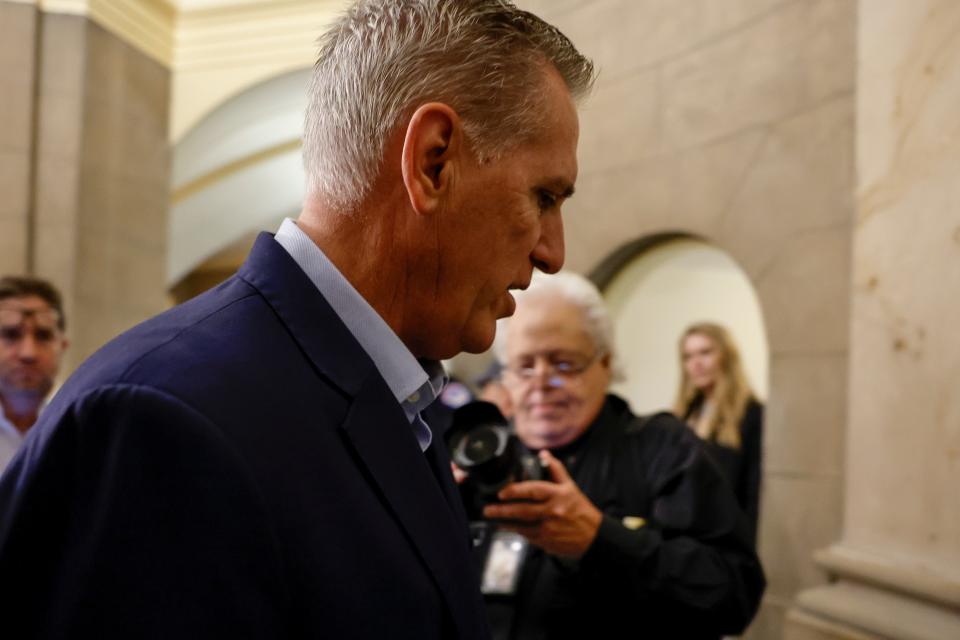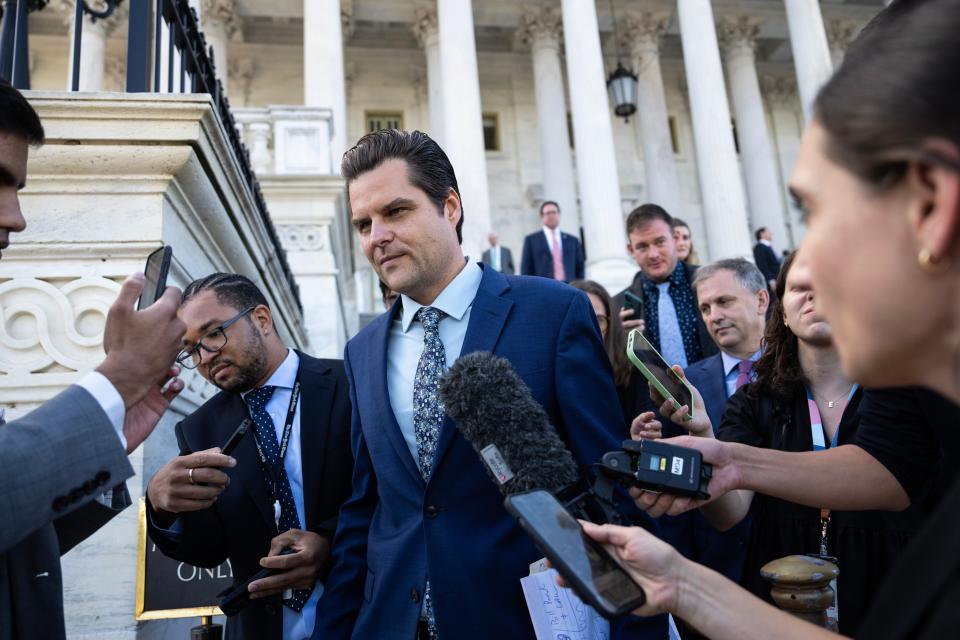House paralyzed without a speaker, increasing the odds of a government shutdown in November
- Oops!Something went wrong.Please try again later.
WASHINGTON – While House Republicans bicker over who should succeed former Speaker Kevin McCarthy, R-Calif., and lead the GOP conference, the House is virtually paralyzed as Congress faces the monumental task of funding the government by mid-November.
After McCarthy’s historic ouster Tuesday, House Republicans adjourned for the week to recuperate and ease high tensions. When they come back next week, the House will hold an election for speaker to determine the lower chamber's top leader.
One of McCarthy’s close allies, Rep. Patrick McHenry, R-N.C., is currently serving in a limited role as acting speaker – speaker pro tempore – but his powers are mostly unclear. McHenry’s main task will be overseeing the next speaker election. Besides committee work, the House will be unable to pass legislation: including key legislation to avert a shutdown.
The original plan for House Republicans, after successfully avoiding a shutdown last weekend, was to pass in October the 12 appropriation bills necessary to fund the government long-term.
McCarthy, following his removal, said Tuesday he had already begun informal discussions with Senate leaders about averting a shutdown.
But his sudden ousting has completely upended those plans with lawmakers going home while mulling over who should serve as the next speaker.
“I’m concerned with the timeline now,” McCarthy said.

'Now is not the time to slow down'
The priority for House Republicans right now, they say, is finding a new leader.
“We’re getting this one thing done first,” Rep. Dan Crenshaw, R-Texas, said about the prospects of a government shutdown while the House is left without a speaker. “We’ll have a speaker by next week … and then the appropriations process will continue.”
Conservative hardliner Rep. Matt Gaetz, R-Fla., who led the efforts to oust McCarthy, defended his rebellion in spite of the Nov. 17 funding deadline. The House, he argued, had already been paralyzed considering Congress left for its August recess instead of focusing on the appropriations process.
Rep. Nancy Mace, S.C., another one of the eight Republicans who voted to remove McCarthy from the speakership, dismissed concerns about the likelihood of a government shutdown after ousting McCarthy.
Under McCarthy’s leadership, Mace argued, the government barely made progress towards averting a shutdown and that several appropriation bills “were not done. They haven’t gotten through.”
“Hopefully we’ll have a new speaker in short order. If we can get it done quickly, then there’s no reason to pause,” Mace said.
The candidates so far jockeying for the speakership have alluded to the time crunch Congress is facing – a problem only exacerbated by the position’s vacancy.
“Now is not the time to slow down,” House Majority Leader, Steve Scalise, R-La., a candidate for speaker, wrote in a letter to his fellow GOP lawmakers. “We laid out an aggressive schedule to complete floor consideration of all 12 appropriations bills to go into Senate negotiations with the strongest hand possible, and we cannot afford to lose any more time achieving that goal.
“At some point we’re going to have to deal with this appropriations process,” House Judiciary chair, Rep. Jim Jordan, R-Ohio, another candidate for speaker, told reporters Wednesday.

Rep. Kevin Hern, R-Okla., chair of the Republican Study Committee, the largest group of House Republicans, told reporters Thursday that his focus as speaker would also be on pushing through the 12 appropriation bills. If House Republicans could do that, the onus of government funding would be on the Senate and the White House, Hern said.
“If we get our 12 appropriation bills done, then it is the White House and Senate that are shutting down the government, not us,” Hern said.
The chaos that has embroiled the House has incited fury from GOP leadership allies and moderate lawmakers.
If the government does shutdown in November, some GOP lawmakers are already laying the blame at the eight members who voted to oust McCarthy. Rep. Garret Graves, R-La., one of McCarthy’s closest allies, singled out Gaetz for leading the insurgency against the former speaker.
“If there is a shutdown in November, that is 100% attributable to Matt Gaetz and the other seven boneheads who forced this,” Graves said. “Matt’s problem is that he often only thinks about how to get attention and that first step where he can create the chaos and get attention.”
“He didn’t think through what happens after that.”

This article originally appeared on USA TODAY: McCarthy fallout: House frozen ahead of government shutdown deadline

